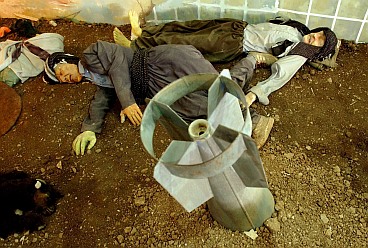Recognise the Kurdish genocide
Recognise the Kurdish genocide

During the Second World War the British Prime Minister Winston Churchill described what Germany was doing in Europe as "a crime without a name." After the war this crime was given a name: genocide.
Harry van Bommel - SP Member of Parliament
The United Nations General Assembly passed the "Convention on the Prevention and Punishment of the Crime of Genocide" in December 1948 and it came into effect in January 1951. The convention says that "genocide, whether committed in time of peace or in time of war is a crime under international law" which the parties to the convention "undertake to punish and prevent." It defines genocide as "acts committed with intent to destroy, in whole or in part, a national, ethnical, racial or religious group." This is exactly what happened in March 1987 when Saddam Hussein began a campaign against the Kurds, which included poison gas attacks and the displacement of thousands. Although the United States now calls the campaign genocide, it didn't at the time because officially there was not enough proof that Saddam was committing genocide against the Kurds. Similar arguments were used in both Rwanda and Bosnia. It was said that there was not enough information, or that what was going on did not fit the legal definition of genocide. The Clinton administration, which was wary of intervention after the collapse of the U.S. mission in Somalia, had a deliberate policy of avoiding use of the term genocide in references to Rwanda, even though 800,000 people were killed in the first 100 days of the civil war. These examples show the importance of an early recognition of genocide. After my first visit to Kurdistan in 2008 I asked the Dutch government whether it qualifies the campaign against the Kurds as genocide and I was extremely disappointed to get a negative answer. Together with politicians throughout Europe I will strive for international recognition of the Anfal campaign as genocide.
 In December last year I visited the town of Halabja and talked to survivors of the poison gas attacks. It is clear that many people still need medical help, although the atrocities happened 23 years ago. It is also obvious that the town of Halabja needs economic and financial support to rebuild houses, roads and institutions. The international community should do more to help. Not just in Halabja or in Kurdistan. The whole of Iraq needs foreign investment in order to recover from the results of the war. I have urged the Dutch government to follow the German example and to open up a fully fledged consulate in Kurdistan to support citizens and the business community in travel and trade. Unfortunately the Netherlands is faced by serious budget cuts, including in the field of diplomacy, and my proposal was rejected. I now intend to talk to the Dutch business community, the Chambers of Commerce and the society of Dutch business corporations VNO to see if they need help in finding their way to Iraq. Rebuilding a country after a war is an enormous task but it also offers a window of opportunity for entrepreneurs.
In December last year I visited the town of Halabja and talked to survivors of the poison gas attacks. It is clear that many people still need medical help, although the atrocities happened 23 years ago. It is also obvious that the town of Halabja needs economic and financial support to rebuild houses, roads and institutions. The international community should do more to help. Not just in Halabja or in Kurdistan. The whole of Iraq needs foreign investment in order to recover from the results of the war. I have urged the Dutch government to follow the German example and to open up a fully fledged consulate in Kurdistan to support citizens and the business community in travel and trade. Unfortunately the Netherlands is faced by serious budget cuts, including in the field of diplomacy, and my proposal was rejected. I now intend to talk to the Dutch business community, the Chambers of Commerce and the society of Dutch business corporations VNO to see if they need help in finding their way to Iraq. Rebuilding a country after a war is an enormous task but it also offers a window of opportunity for entrepreneurs.
Exactly a year ago I spoke at the Halabja commemoration on the pavement across from the headquarters of the Organisation for the Prohibition of Chemical Weapons in The Hague. In that speech I promised I would put a great effort in acquiring a decent location for the Kurdish community in the Netherlands to commemorate the atrocities of Anfal and Halabja. Together with the Foundation Halabja Monument, surviving victims of the atrocities and others, I hope that we can serve the interest of the people of Iraq who faced hard times under the tyranny of Saddam Hussein and in many cases continue to live under poor conditions. The international community took away the threat of the dictator, now let us work together to bring lasting peace and prosperity to the people of Iraq.
